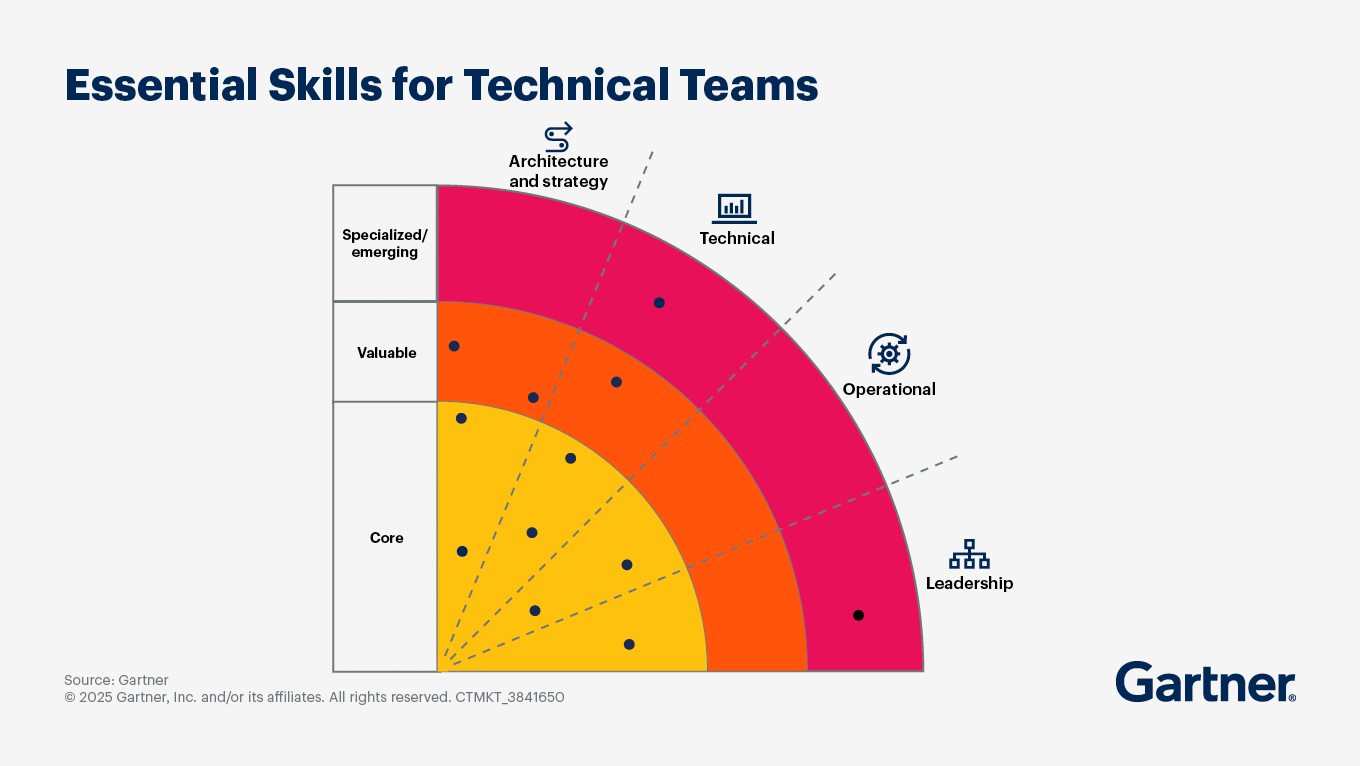Equip your technical teams with the capabilities needed to execute your digital strategy and meet enterprise outcomes.
- Gartner client? Log in for personalized search results.
Essential skills are the CIO’s execution engine
CIOs today face accelerating demands: deliver AI and automation, fortify security, drive data value and evolve infrastructure — all with leaner teams and rising complexity. But while strategy sets the direction, execution depends on the people.
That’s why identifying and closing essential skills gaps across your architecture, engineering and delivery teams is a top priority. According to Gartner, 85% of IT leaders say their current IT workforce is unprepared to meet their enterprise’s future skills requirements. Given this reality, CIOs must invest in the right capabilities and create cultures that support continuous learning and agility.
Upskilling at scale: Redefine your IT talent strategy
Building and maintaining competitive advantage demands continuous skill development, strategic reskilling and modernizing cultures across every layer of IT. Gartner research shows that only 15% of IT leaders believe their current workforce is prepared for future needs — a gap that directly impacts the ability to deliver on transformation goals.
Attract and retain talent by cultivating essential skills to meet business leadership innovation demands
Most IT organizations are struggling to hire for niche skills in cloud, security, automation and architecture. As a result, 84% of CIOs and IT leaders are actively engaged in reskilling their current employees to ensure they possess the necessary skills to execute digital strategies successfully.
A staggering 85% of IT leaders acknowledge that their current IT workforce is unprepared to meet the future skills requirements of their enterprise. This emphasizes an urgent need for upskilling and reskilling initiatives to address the skills gap and ensure the workforce is equipped for upcoming challenges and opportunities.
Foster a culture of continuous essential skills learning with talent development in a rapidly evolving technology landscape
It’s crucial for organizations to foster a culture of continuous learning and ensure their workforce possess the necessary skills for success. Gartner’s principle of progressive layering provides a framework to achieve this by categorizing skills into foundational, role-specific and new skills.
This principle ensures employees are well-rounded with the skills needed for the present and future, but also enables organizations to cultivate a continuous agile learning culture.
Expand and modernize technical teams’ essential skills to execute strategic initiatives, and address operational challenges
Technical architects play a critical role in designing and implementing robust and innovative IT solutions that drive business success, so it’s increasingly important to prioritize the development of technical skills, especially in the rapidly evolving technology landscape.
Gartner offers an approach that prioritizes the skills to learn based on specific criteria, which considers the relevance and positive impact of each skill, as well as the challenges involved in learning and applying them effectively. Plus, Gartner identifies and outlines the essential architecture skills that technical architects should focus on.
Are you a CIO or IT leader at a midsize enterprise?
See how your peers are navigating AI adoption, vendor decisions and evolving business demands — with tools tailored to your role:
Explore our resources for midsize enterprises
Check out a curated list of Gartner’s most popular research being utilized by your peers
Essential skills FAQs
What are the key areas that IT leaders effectively contribute to enterprise growth?
According to Gartner, IT leaders must align their efforts with the enterprise’s mission-critical priorities, specifically around:
Digital transformation
Cybersecurity and data privacy
Talent management and digital skills
What tools and research does Gartner have on essential IT skills?
Gartner has extensive essential skills coverage designed for architects and engineers in areas like: software engineering, enterprise applications, data and analytics, cybersecurity and risk management and infrastructure and operations.
Attend a Conference
Accelerate growth with Gartner conferences
Gain exclusive insights on the latest trends, receive one-on-one guidance from a Gartner expert, network with a community of your peers and leave ready to tackle your mission-critical priorities.

Drive stronger performance on your mission-critical priorities.
